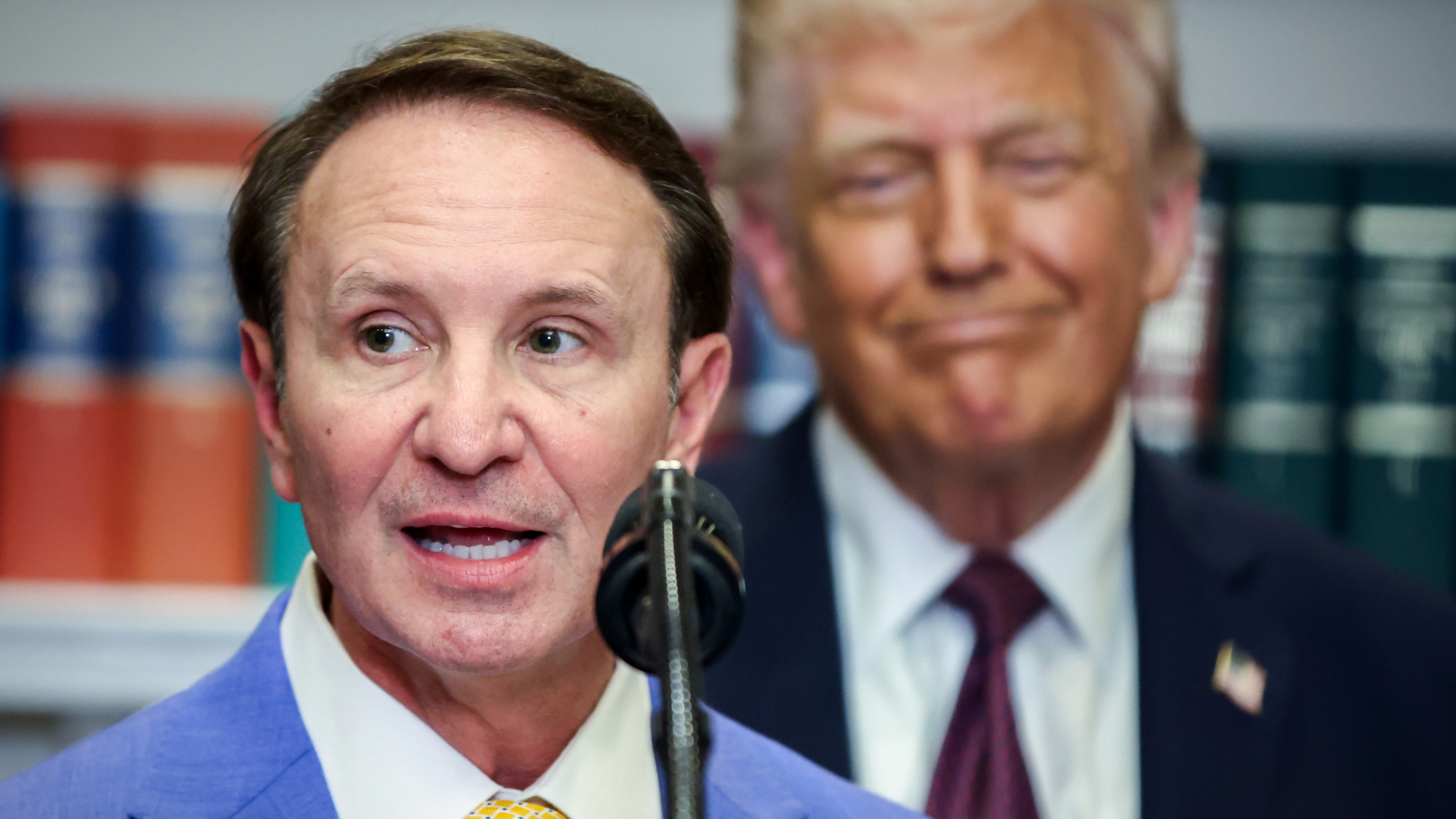What did Turkey get for greenlighting Sweden's NATO bid?
A "historic step" for the Cold War era alliance — and a major win for President Biden's foreign agenda


A free daily email with the biggest news stories of the day – and the best features from TheWeek.com
You are now subscribed
Your newsletter sign-up was successful
After more than a year of obstinance and obstruction, Turkish President Recep Tayyip Erdogan abruptly dropped his longstanding objections to Sweden's effort to join the North Atlantic Treaty Organization, just hours before a NATO summit in Vilnius, Lithuania, was set to begin on Tuesday. Speaking with reporters to announce the move, NATO Secretary-General Jens Stoltenberg called Turkey's decision "a historic step that benefits the security of all NATO allies at this critical time. It makes us all stronger and safer."
While Sweden's ultimate ascension into NATO's ranks is far from complete, the Turkish about-face portends a major shift in the balance of European power, and marks a major victory for President Biden, who has pushed for a NATO expansion in the face of Russia's ongoing invasion of Ukraine. But what led to Erdogan's change of heart? And where do Turkey, Sweden and the whole of NATO go from here?
What are the commentators saying?
The Turkish leader's pivot "follows a series of moves in recent days that signal a potential easing of strained ties with Western countries during the war in Ukraine," reported The Wall Street Journal. In particular, "Sweden agreed to support expanding the E.U.'s free-trade arrangement with Turkey," The Washington Post said, adding that "Erdogan's most important ask has long been clear." That ask — a multi billion-dollar purchase of F-16 fighter jets from Lockheed Martin — seemed poised to move forward in light of the Sweden decision, with National Security Advisor Jake Sullivan telling reporters that Biden "supports" and "intends to move forward with" the deal.
The Week
Escape your echo chamber. Get the facts behind the news, plus analysis from multiple perspectives.

Sign up for The Week's Free Newsletters
From our morning news briefing to a weekly Good News Newsletter, get the best of The Week delivered directly to your inbox.
From our morning news briefing to a weekly Good News Newsletter, get the best of The Week delivered directly to your inbox.
As part of the agreement, Sweden also committed not to support the separatist Kurdistan Workers Party, a longtime antagonist toward Turkey, which has been labeled a terrorist group by the United States since the mid-1990s. Moreover, in exchange for Turkey's cooperation, Stoltenberg reportedly "agreed to create a new post of 'Special Coordinator for Counter-Terrorism' at NATO," according to Politico.
Like much in Europe over this past year, the NATO announcement is closely tied to the Ukraine war. "Erdogan had already signaled this weekend that he can be a critical partner for Europe by showing solidarity regarding Ukraine," the Post said, highlighting a series of aid and reconstruction agreements signed between the two countries, as well as a repatriation agreement for some Ukrainian military leaders, which has particularly "angered the Kremlin."
Crucially, alongside Finland (which joined the alliance earlier this year), Sweden's impending entry into NATO "essentially turns the Baltic Sea into a NATO-dominated waterway," and "enhances NATO's ability to protect its most vulnerable members: the Baltic nations," The New York Times explained. Both Sweden and Finland had previously held staunchly neutral positions in Europe, but the Russian invasion of Ukraine prompted each nation to conclude that "membership in the European Union alone was not security enough."
What comes next?
Despite the momentous nature of this week's announcement, Sweden's official entry into NATO is still a ways away. According to the agreement, Turkey's next step will be to "transmit the Accession Protocol for Sweden to the Grand National Assembly, and work closely with the Assembly to ensure ratification." Notably, Turkey has not been alone in opposing Sweden's effort to join the alliance — Hungary's conservative government under Prime Minister Viktor Orbán has also stonewalled the bid, although, Politico says, Stoltenberg stressed that Orbán had "promised that his country would not be the last holdout against Sweden's membership."
A free daily email with the biggest news stories of the day – and the best features from TheWeek.com
The White House, meanwhile, has spent the day following the Sweden announcement trying to frame itself as a supportive partner, rather than key participant in the agreement, with one administration official telling Politico that "while we were not direct parties to the negotiations here, we were heavily encouraging and supportive of them and obviously very heavily engaged diplomatically in conversations with everyone involved." Those conversations included "a telephone call between Biden and Erdogan on Sunday, in which the American president appears to have made his position crystal clear," CNN reported.
Regardless of the degree to which the White House was hands-on involved in the actual drafting of the agreement itself, "Erdogan's decision before an expected bilateral meeting with Biden is a significant diplomatic victory for Biden," The Hill said. In particular, it comes amid the 2024 presidential race, in which Biden has "sought to live up" to his 2020 campaign pledge to serve as a "steady hand in foreign policy."
Similarly, while the agreement has secured a number of assurances regarding Turkey's continued relationship with the E.U., "all of these steps – while possibly giving Erdogan political cover back home for his shift of position – hardly seem like big breakthroughs for Turkey," CNN said. Rather, they may represent more broadly "a significant break" between Erdogan and Russian President Vladimir Putin.
"But," CNN cautioned, anyone who expects Erdogan "to quit playing multiple sides of the great geopolitical game will likely be disappointed."
Rafi Schwartz has worked as a politics writer at The Week since 2022, where he covers elections, Congress and the White House. He was previously a contributing writer with Mic focusing largely on politics, a senior writer with Splinter News, a staff writer for Fusion's news lab, and the managing editor of Heeb Magazine, a Jewish life and culture publication. Rafi's work has appeared in Rolling Stone, GOOD and The Forward, among others.
-
 What to know before filing your own taxes for the first time
What to know before filing your own taxes for the first timethe explainer Tackle this financial milestone with confidence
-
 The biggest box office flops of the 21st century
The biggest box office flops of the 21st centuryin depth Unnecessary remakes and turgid, expensive CGI-fests highlight this list of these most notorious box-office losers
-
 The 10 most infamous abductions in modern history
The 10 most infamous abductions in modern historyin depth The taking of Savannah Guthrie’s mother, Nancy, is the latest in a long string of high-profile kidnappings
-
 The ‘mad king’: has Trump finally lost it?
The ‘mad king’: has Trump finally lost it?Talking Point Rambling speeches, wind turbine obsession, and an ‘unhinged’ letter to Norway’s prime minister have caused concern whether the rest of his term is ‘sustainable’
-
 Is the American era officially over?
Is the American era officially over?Talking Points Trump’s trade wars and Greenland push are alienating old allies
-
 Trump’s Greenland ambitions push NATO to the edge
Trump’s Greenland ambitions push NATO to the edgeTalking Points The military alliance is facing its worst-ever crisis
-
 Can Starmer continue to walk the Trump tightrope?
Can Starmer continue to walk the Trump tightrope?Today's Big Question PM condemns US tariff threat but is less confrontational than some European allies
-
 EU-Mercosur mega trade deal: 25 years in the making
EU-Mercosur mega trade deal: 25 years in the makingThe Explainer Despite opposition from France and Ireland among others, the ‘significant’ agreement with the South American bloc is set to finally go ahead
-
 Danes ‘outraged’ at revived Trump Greenland push
Danes ‘outraged’ at revived Trump Greenland pushSpeed Read
-
 Who is paying for Europe’s €90bn Ukraine loan?
Who is paying for Europe’s €90bn Ukraine loan?Today’s Big Question Kyiv secures crucial funding but the EU ‘blinked’ at the chance to strike a bold blow against Russia
-
 Moscow cheers Trump’s new ‘America First’ strategy
Moscow cheers Trump’s new ‘America First’ strategyspeed read The president’s national security strategy seeks ‘strategic stability’ with Russia
